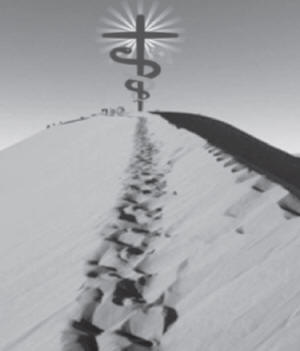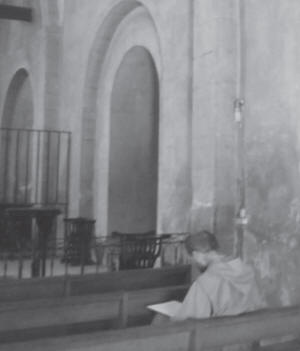Catholic Medical Quarterly Volume 69(1) February 2019
Editorial
Following Jesus in Healthcare
Adrian Treloar
How do we follow our faith in healthcare today?
 The
Annual Conference of the CMA will look at this question in Hull on the 4th
May. We must recognise that it has always been a challenge to follow our
faith at work but we should also, perhaps, admit that we may be
approaching a time when it is especially hard.
The
Annual Conference of the CMA will look at this question in Hull on the 4th
May. We must recognise that it has always been a challenge to follow our
faith at work but we should also, perhaps, admit that we may be
approaching a time when it is especially hard.
At the centre of our faith are the great miracles of Jesus in the Holy Land. Often described and translated into English as “cures”, older translations such as the Douay Rheims and King James Versions used the phrase “being made whole” [Matthew 6, 55-56 and elsewhere in the Gospels]. So in fact, in his time on earth, Our Lord saw the healing that He did as a restoration to a physical and spiritual wholeness. Not merely a state of physical health. Happily for us, the World Health Organisation defines health as a state of physical, mental and spiritual wellbeing. And as health workers, we are asked to promote health which turns out to be “wholeness”. Better still the Constitution of the World Health Organization still defines health as a “state of complete physical, mental and social well-being and not merely the absence of disease or infirmity”[1]. Making people whole is what healthcare workers do. Holistic medicine is where we are at.
And running through that whole country, they began to carry about in beds those that were sick, where they heard he was. And whithersoever he entered, into towns or into villages or cities, they laid the sick in the streets, and besought him that they might touch but the hem of his garment: and as many as touched him were made whole. Mark 6, 55-56.
As Bishop Davies said during advent [2] “Our renewal in holiness is the only renewal of the Church that will ever matter". Bishop Davies quotes Pope Francis who says "The Lord wants us to be saints and not to settle for a bland and mediocre existence", for it is only by being holy that we can be truly happy. The Holy Father writes, "Do not be afraid to set your sights higher, to allow yourself to be loved and liberated by God". For holiness, he writes, is "the extent that, by the power of the Holy Spirit, we model our life on Christ's" ...."Let us ask the Holy Spirit to pour out on us a fervent longing to be saints for God's greater glory, and let us encourage one another in this effort".
Bishop Davies continued “We can never reach this goal by our own unaided efforts. efforts. By the grace of God we can!”
That need for Grace must be even greater for Doctors, nurses and other healthcare workers who find themselves so deeply challenged on matters of faith, morals and ethics. To enable that grace to live within us, we need to sort a few things out for ourselves. I would suggest that there are several key themes that each of us need to explore.
- We must always aim to provide excellent, caring and compassionate healthcare. We cannot be good clinicians merely because we are Christians. Our Christian faith must drive us to be excellent, to go the extra mile and always to do excellent medicine, delivered humbly and compassionately
- We must never think that we are better doctors or better nurses simply because we are Christian. I have seen many fall into that trap and in their failings they bring great scandal upon Jesus Christ and upon His Church.
- We must pray, deepen our faith and continue to see our
vocation in healthcare as an expression of Christ’s love for us.
a. Attending Mass regularly
b. Praying regularly (I was strongly and helpfully guided toward the Rosary by Fr Hugh Thwaites while he was Chaplain to Guys Hospital when I was a student there)
c. Attending confession and including our work as a part of our examination of conscience - We must seek to understand medical ethics and to be able to discern what is right and wrong
- We must be willing to say no when things are wrong and to speak out
- But far more often we must be willing to gently, and humbly, encourage others towards what is right
- We must engage in public policy development, promoting what is good and what is right.
- We must do all of that with love and a smile.
David Quinn the Director of the Iona Institute will be one of our keynote speakers in Hull and will share his thoughts on how we can and should do this.
 In
every setting we will greatly help by seeing the humanity of the people
whom we serve. Not unlike many medical colleagues Fr Hugh Thwaites once
told me that several women had been to see him shocked at being pregnant.
Fr Thwaites told me that upon hearing the news he would always respond
with a smile;- a clear but gentle welcome for the child within, who was
immediately humanised by the smile.
In
every setting we will greatly help by seeing the humanity of the people
whom we serve. Not unlike many medical colleagues Fr Hugh Thwaites once
told me that several women had been to see him shocked at being pregnant.
Fr Thwaites told me that upon hearing the news he would always respond
with a smile;- a clear but gentle welcome for the child within, who was
immediately humanised by the smile.
I have found his observation very helpful in General Practice and also in care of the elderly. To see the humanity in an unborn child, or in a dying elderly person can be truly transformative. As St Catherine Labouré said “I saw the face of Christ in each one.” [3]
As Fr Gerard Toman tells us in this edition of the CMQ [page 8], work is prayer. And yet we need a prayerful foundation to allow that to become true.
There will be much to discuss and explore in Hull on the 4th May. The CMA will be the guests of Hull University Catholic Chaplaincy. Do please book your place and come along.
References
- World Health Organization (1946).Constitution https://www.who.int/about/mission/en/
- Shrewsbury: Bishop Davies dedicates 2019 as Year of Holiness. Dec 3rd, 2018 Independent Catholic News www.indcatholicnews.com/news/36113
- Great Medical Lives. St Catherine Labouré: Seeing the face of Christ in the sick and suffering. Catholic Medical Quarterly Volume 66(3) Aug 2016. www.cmq.org.uk/CMQ/2016/Aug/st_catherine_laboure.html
Adrian Treloar FRCP, MRCPsych, MRCGP is a Consultant and Former Senior
Lecturer in Old Age Psychiatry.
He is also Assistant Editor of the
Catholic Medical Quarterly.
